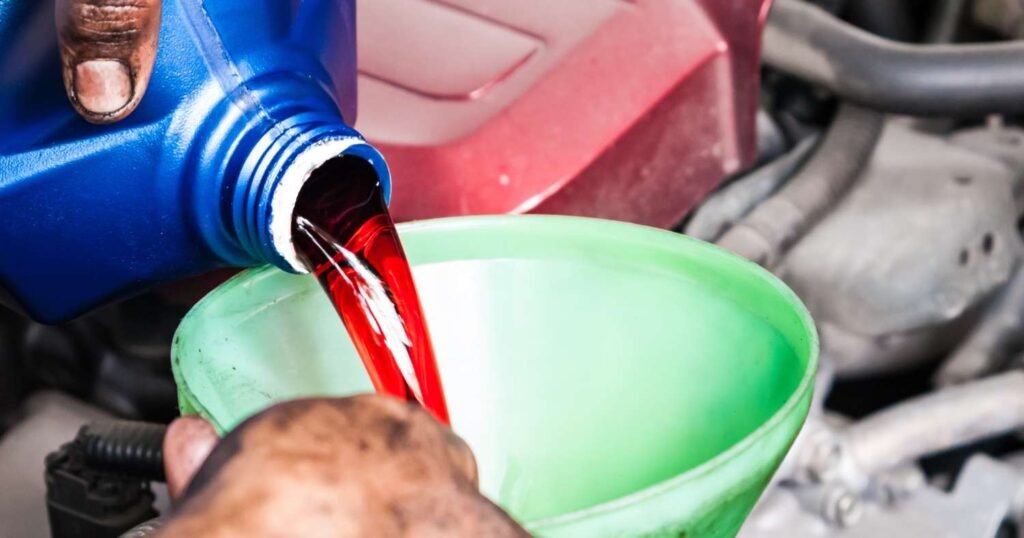Owning a Nissan comes with the joy of reliable performance and innovative technology. However, regular maintenance is key to keeping it running smoothly like any vehicle. One crucial aspect of maintenance is changing the transmission fluid, a task that extends the life of your transmission and optimizes its performance.
But how much does a Nissan transmission fluid change cost? The answer might surprise you, as it depends on several factors.
Nissan Transmission Fluid Change Cost: Varies from $150 to $600 depending on factors like type of service, transmission, location, and mechanic. Drain & refill is cheaper than a full flush, but CVTs require special fluid and handling, costing $350 to $400.
Why Prioritize CVT Fluid Changes: Extends transmission life, maintains fuel economy, and ensures smooth driving. Neglecting it can lead to costly repairs like overheating, wear & tear, and even complete failure.
[/et_pb_blurb][/et_pb_column][/et_pb_row][/et_pb_section]Table of Contents
How much does Nissan Transmission Fluid Change cost?
The cost of Nissan transmission fluid change in the US may differ, ranging from $150 to $600, depending on a few factors.
For a Drain and Refill, the cost ranges between $150 to $250 for conventional transmissions and $350 to $400 for CVTs.
For a Full Flush, the cost ranges between $300 to $400 for conventional transmissions and $450 to $600 for CVTs.

The following factors can influence the cost:
Your Nissan model: Different models use different transmissions, requiring specific fluids and procedures. For example, Nissan’s popular Continuously Variable Transmission (CVT) requires a unique fluid and specialized handling compared to traditional automatic transmissions.
Location: Labor costs vary depending on the geographical region. Expect higher rates in metropolitan areas compared to rural ones.
Chosen service provider: Dealerships generally charge more than independent repair shops, although they might offer warranties and specialized expertise.
Service type: A simple drain and refill is less expensive than a full flush, which involves replacing all the fluid in the system.
What is a CVT Fluid Change?
Unlike traditional automatic transmissions, CVTs utilize a belt and pulley system for seamless gear transitions. Maintaining optimal performance hinges on a clean and effective transmission fluid.
A CVT fluid change involves draining the old, potentially contaminated fluid and replacing it with fresh lubricant, ensuring smooth operation and preventing costly transmission damage.
What is Full Flush or Drain and Refill?
Both methods have their merits and drawbacks:
- Drain and Refill: Cost-effective but doesn’t remove all the old fluid, leaving behind contaminants.
- Full Flush: More thorough, replacing all the fluid and potentially extending transmission life, but comes at a higher price and may not be suitable for older vehicles with delicate transmissions.
Consult your mechanic or research your specific model to determine the best approach for your Nissan.
Why Prioritize Routine CVT Fluid Changes?
Like engine oil, CVT fluid serves a vital purpose – lubricating moving parts and mitigating heat buildup during operation. Over time, the fluid degrades, losing its lubricating properties and accumulating contaminants. This can lead to the following:
- Reduced Transmission Efficiency: Sluggish acceleration, rough shifting, and increased fuel consumption are telltale signs of neglected CVT fluid.
- Premature Component Wear: Friction caused by degraded fluid accelerates wear and tear on internal components, potentially leading to expensive repairs.
- Transmission Overheating: Ineffective lubrication can generate excessive heat, compromising the fluid’s effectiveness and jeopardizing transmission health.
Why Is It Worth Doing Nissan’s Transmission Fluid?
While the initial cost might seem substantial, neglecting regular CVT fluid changes can lead to far more expensive repairs down the line. Consider this investment as an essential preventative measure to:
- Extend the Lifespan of Your CVT: Regular fluid changes keep your transmission running smoothly and efficiently, maximizing its lifespan and saving you from costly replacements.
- Maintain Optimal Fuel Efficiency: A well-maintained CVT delivers optimal fuel economy, allowing you to stretch your mileage further.
- Enjoy a Smooth and Responsive Ride: Fresh CVT fluid translates to smooth gear transitions and a more responsive driving experience.
How often should I change my Nissan’s transmission fluid?
Nissan recommends following the maintenance schedule outlined in your owner’s manual for specific change intervals. However, a general guideline suggests:
- Conventional Automatic Transmission: Every 30,000 – 60,000 miles.
- Continuously Variable Transmission (CVT): Every 30,000 – 50,000 miles, depending on driving conditions and model year.
Factors influencing frequency:
- Severe Driving Conditions: Frequent stop-and-go driving, towing, or mountainous terrain may necessitate more frequent changes.
- High Mileage: Older vehicles may benefit from frequent changes to ensure optimal performance.

Recommended: How Much is an Oil Change at Nissan?
Essential Signs that Scream “Change My Transmission Fluid!”
Ignoring your Altima’s transmission fluid is a recipe for costly repairs. Heed these warning signs for a timely fluid change:
- Low Fluid Level: This no-brainer indicates potential leaks or internal issues. Don’t wait for bone-dry levels – get it checked!
- Suspicious Leaks: Transmission fluid leaks, often red or brown, are like unwelcome houseguests. Spot them on your driveway or under the car and schedule a service appointment.
- Dark and Dirty Fluid: Fresh transmission fluid boasts a vibrant pink or red hue. Murky brown or black fluid signifies neglect and potential internal wear.
- Performance Problems: Clunky gear changes, hesitation, strange noises, or rough shifting all scream for immediate attention. Don’t gamble with your transmission’s health.
Transmission Fluid Change: Urgent or Optional?
Procrastination with transmission fluid changes is a gamble you shouldn’t take. This fluid performs the vital roles of lubrication, cooling, and hydraulic pressure transmission. Neglecting it leads to:
- Increased Friction and Wear: Imagine gears grinding without oil – that’s what happens with depleted or degraded fluid. This accelerates wear and tear, leading to costly repairs.
- Overheating and Damage: Friction generates heat, and without proper cooling from the fluid, your transmission cooks itself from the inside out.
- Complete Transmission Failure: The ultimate nightmare – a seized or locked-up transmission, leaving you stranded and facing a hefty repair bill.
Beyond the Fluid Change: Related Repairs to Consider
While a transmission fluid change is crucial, it might not be the only service your Altima needs. Depending on the severity of the problem, additional repairs might be necessary, such as:
- Clutch Repair: Clutch issues can manifest alongside faulty fluid if your Altima uses a traditional automatic transmission.
- Transmission Assembly Replacement: In extreme cases, the entire transmission assembly might require replacement.
- Transmission Lines Replacement: Leaky or damaged lines need attention to prevent further fluid loss and potential harm.
- Transmission Mount Replacement: Worn mounts can cause vibrations and contribute to internal wear.
- Transmission Rebuild: In the worst-case scenario, a complete rebuild might be necessary to restore functionality.
What are Nissan’s working hours for transmission fluid change?
Nissan dealerships generally operate from Monday to Friday, with business hours usually between 8:00 AM and 6:00 PM. Some dealerships may also provide Saturday service with slightly shorter hours.
However, the exact hours of each dealership may vary depending on its location. To confirm the exact schedule for transmission fluid change service, it is recommended to call your local Nissan dealership directly.
How Long Does it take to do a Transmission fluid change at Nissan?
The time it takes for a transmission fluid change at Nissan can vary depending on several factors, including:
- Type of transmission: Conventional automatic transmissions generally take less time than CVTs.
- Type of service: A simple drain and refill is quicker than a full flush.
- Mechanic workload: Service wait times can fluctuate depending on the dealership’s current workload.
In general, expect a drain and refill to take around 1-2 hours and a full flush to take closer to 2-3 hours. However, it’s always best to check with your local dealership for their specific estimated service times for your vehicle.
How do you make an appointment at Nissan for a transmission fluid change?
You can make an appointment for a transmission fluid change at Nissan in several ways:
- Call your local Nissan dealership directly. This is the most straightforward option; they can answer any questions about the service and availability.
- Use the online scheduling tool on the Nissan website. Many Nissan dealerships offer online scheduling for service appointments. Navigate to your local dealership’s website and search for “service scheduling.”
- Use a third-party appointment booking service. Several online platforms allow you to schedule appointments at dealerships, including Nissan. Check with your local dealership to see if they partner with these services.
Make Informed Decisions with the above details.
With this knowledge, you can make informed choices about your Nissan transmission fluid change:
- Compare prices: Get quotes from dealerships and independent shops in your area to find the best value.
- Ask about service types: Clarify whether they recommend a drain and refill or a full flush based on your Nissan model and mileage.
- Consider DIY: If you’re mechanically inclined, changing the fluid yourself can be cost-effective, but ensure you have the necessary tools and knowledge for your specific Nissan model.
Remember, neglecting this crucial maintenance can lead to costly repairs down the line. Investing in a regular Nissan transmission fluid change is an investment in the longevity and performance of your vehicle, ensuring smooth rides for miles to come.
Final Words
By demystifying CVT fluid changes’ intricacies and associated costs, this guide empowers you to make informed decisions for your vehicle’s health and longevity. Remember, investing in regular maintenance translates to smooth performance, optimal fuel efficiency, and peace of mind, knowing your CVT is humming along as it should.
Relevant:
Does Walmart Change Transmission Fluid?
How Much Is A Transmission Fluid Change Cost At Valvoline?
FAQs
Does Nissan flush transmission fluid?
Yes, Nissan dealerships and some independent mechanics offer full transmission flushes. However, consult your mechanic to determine whether it suits your specific vehicle.
How often should Nissan transmission fluid be changed?
Consult your owner’s manual for specific recommendations, but generally, Nissan advises CVT fluid changes every 30,000-60,000 miles and traditional automatic transmission fluid changes every 60,000-90,000 miles. Consider factors like driving conditions and heavy towing when determining appropriate intervals.
How much should a full transmission fluid change cost?
Expect to pay $350 – $400 for conventional transmissions and $450 – $600 for CVTs.
Does Nissan flush transmission fluid?
Yes, Nissan dealerships and some independent mechanics offer full transmission flushes. However, consult your mechanic to determine whether it suits your specific vehicle.
Can I perform a CVT fluid change myself?
While DIY fluid changes are possible for some models, CVT changes can be complex, requiring specialized tools and knowledge. Unless you’re a seasoned mechanic, entrusting the task to a qualified professional is recommended to ensure proper procedures and avoid potential damage.
Are there any signs that indicate I need a CVT fluid change sooner than scheduled?
Warning signs like jerky gear changes, grinding noises, or a burning smell emanating from the transmission could indicate contaminated or degraded CVT fluid. If you experience any of these symptoms, promptly seek professional service.

